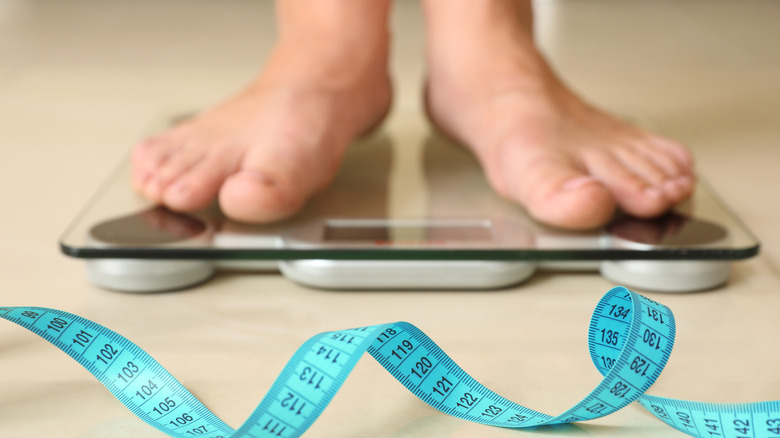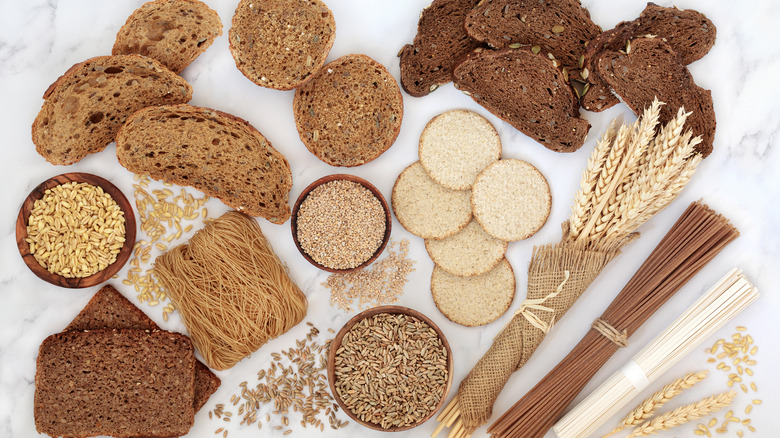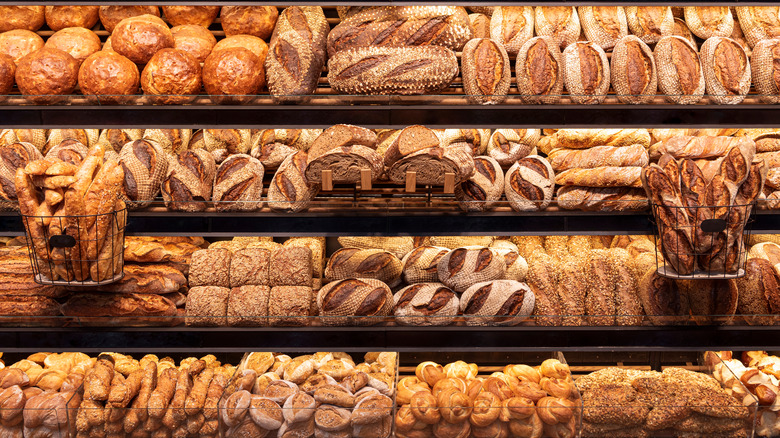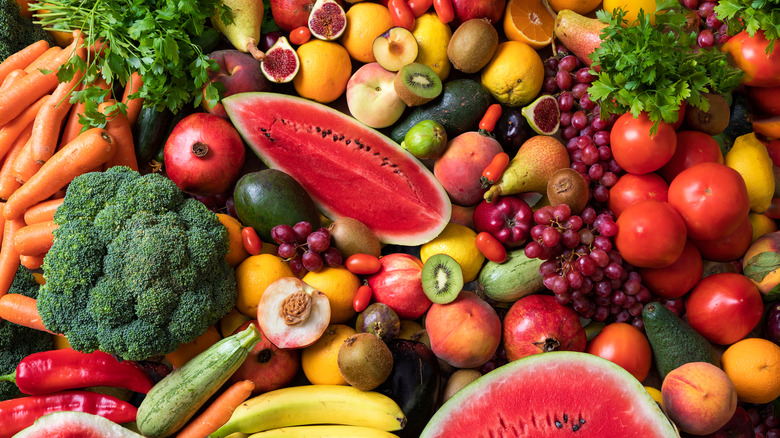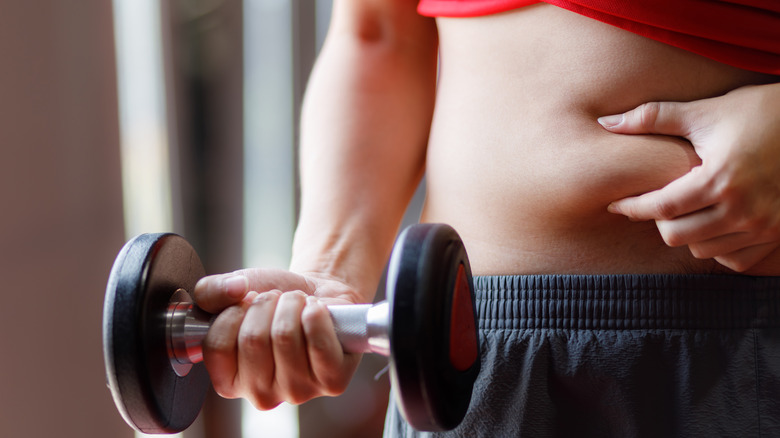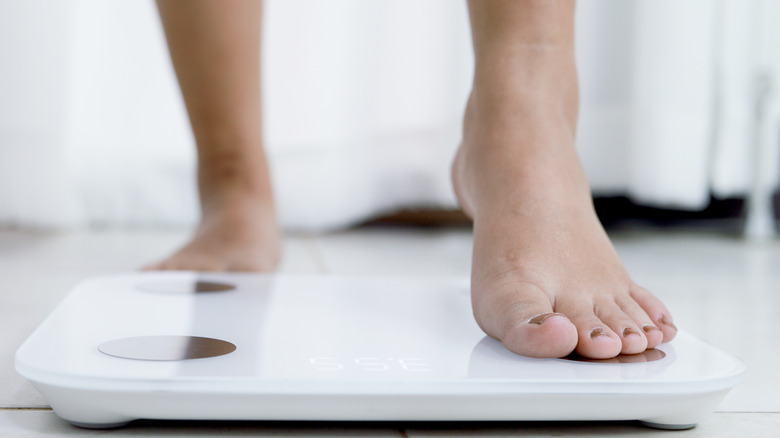Weight Loss Myths You Should Stop Believing
Among the countless people out there who are trying to lose weight, how many of them are finding it a constant struggle? They're willing to try just about anything and everything. They seek advice from friends or even so-called health experts about what to eat or how to exercise. And none of it seems to work! They end up frustrated because they're not losing weight — or maybe they've even gained.
Sound familiar? Chances are you've been in this situation. But the thing is, a lot of the weight loss guidance you're getting is completely wrong. And these misconceptions are so widespread that few of us ever stop to question them. Some of this bad advice is based on outdated research, or else it's been debunked by doctors and dietitians.
So, what are some of the worst offenders? Here are the biggest weight loss myths you should stop believing, and what the experts say you should do instead.
Myth: It's all about counting calories
Most people making a conscious effort to lose weight are familiar with the concept of checking nutrition labels to figure out how many calories they're consuming based on portion size — then adding that number up with the other calories they're consumed so far that day. It's stressful!
Well, here's some good news for everybody who hates math: Counting calories isn't as important as people make it out to be. Although it's true that a caloric deficit is necessary to lose fat — and a caloric excess is what causes fat gain — sustainable weight loss isn't as simple as staying within a certain limit of calories. In other words, eating 2,000 calories' worth of junk food is not the same as eating 2,000 calories' worth of nutrient-dense, unprocessed food — and we'll let you guess which option is better for you.
As Harvard Health Publishing explains, different foods are broken down and used by the body in different ways. Refined carbohydrates are processed very quickly, so calories from sugary foods won't sustain you quite the way calories from slow-digesting fat and protein do. Furthermore, according to HuffPost, balanced nutrition ensures your body functions to the best of its ability and is able to use the fuel that you're giving it.
Myth: Eating fat makes you put on fat
For the longest time, dieters clung to the belief that dietary fat ultimately became body fat — that when a person eats foods like peanut butter, avocado, coconut, or yogurt, these fat-dense foods were going to result in a few too many added pounds. To some extent, the idea makes sense — fat is calorically dense, yielding 9 calories per gram compared with the 4 calories per gram you'd get from carbohydrates or protein (via Merck Manual).
But dietary fat is necessary for good health and hardly to be blamed for weight gain, according to Verywell Fit. On the contrary, fat can actually be helpful in a person's weight loss efforts. Fat slows down digestion, so people who include some fat in their diet will find they feel more satisfied when they finish up a meal, and they'll feel fuller for a longer period of time afterward (so you won't be craving snacks quite as much between meals). It's just as important to note that fat tastes good, so you won't feel deprived the way you would be if you were eating unbuttered toast or undressed salads. And your body even needs some dietary fat if it is going to properly absorb fat-soluble vitamins!
Myth: Cutting carbs is the best way to lose weight
On the flip side of the low-fat diet is the low-carb diet, another trendy method of losing weight in which dieters swear off bread, grains, starches, and even certain fruits and vegetables. The problem is that carbohydrates are an important part of a healthy diet and can actually help you lose weight — as long as you're eating the right ones.
True, simple carbs like sugar can lead to spikes in your blood glucose, which affect your energy levels and ultimately trigger cravings. So, yes, these simple carbs can lead to gain weight. But Eat This, Not That explains that if you focus on filling your diet with complex carbohydrates, you'll have the benefit of sustained energy because they take much longer for your body to metabolize. Foods with complex carbohydrates are also often great sources of fiber, a type of carbohydrate known for keeping you feeling full and improving digestion.
When considering sources of carbohydrates, choose whole grains like oats, wheat, and barley, as well as those from beans, legumes, fruits, and vegetables.
Myth: You'll have to get used to hunger
Our culture seems to love the notion that losing weight is a miserable experience — if you're going to improve your diet and shed pounds, you need to get used to being hungry. But that's not the case at all! In fact, if you're feeling deprived, it probably means that you're doing something wrong. Hunger can lead to loss of control later on, ultimately ruining any healthy eating goals you've set for yourself. Besides, who wants to be miserable all the time?
The CDC explains how it's possible to consume fewer calories without actually eating less food because you're focusing on low-energy, high-volume foods. These take up the same amount of room in your stomach, but they aren't as calorically dense. In other words, a half-cup of vegetables has a fraction of the calories you would see in a half-cup of potato chips or pretzels. Many fruits and vegetables have a high water content — they're mostly water — which keeps you hydrated but doesn't actually yield any energy. That means you can eat a large volume of these foods without overconsuming calories. Plus, you'll be getting plenty of vitamins and minerals to keep you feeling your best.
Myth: Gluten is the reason you're not losing weight
Giving up gluten as a way of losing weight has become a pretty popular trend over the past decade or so, but most health experts agree that it's not the healthiest way of eating for people who don't have a diagnosed gluten intolerance (such as celiac disease). While the small percentage of people who can't digest gluten, a type of protein found in wheat, do benefit from adopting this lifestyle, don't expect a gluten-free diet to be the miracle answer you're probably seeking.
For starters, gluten-free diets tend to be lower in fiber, iron, and certain vitamins and minerals, so even those who have no choice but to give up gluten need to be careful about monitoring their diet to maintain good nutrition, Harvard School of Public Health points out. The other problem is that gluten-free alternatives to many processed foods are actually higher in sugar, fat, and calories than their traditional versions, so people who go gluten-free run the risk of gaining weight instead of losing it.
All of that said, adopting a gluten-free way of eating can be beneficial if you're swapping out cookies, cake, pizza, and refined pasta for whole, unprocessed foods like fruits, vegetables, and lean proteins. You might even discover that you like other whole grains like quinoa and brown rice.
Myth: Eating vegetarian is a surefire way to lose weight
Meat, eggs, and dairy tend to be high in calories and fat, so it makes sense that cutting them out of your diet would help you stay trim, right? Well ... maybe. But it's not guaranteed, especially if you're not making overall healthy choices with your diet. Eating vegetarian or vegan has plenty of health benefits if you stick with building your meals around vegetables, beans, legumes, and whole grains. But just as giving up gluten isn't a guarantee that your diet will automatically be healthy, giving up meat and dairy isn't necessarily a surefire way to lose weight either, according to the Mayo Clinic.
Plenty of meat-free foods can still be high in calories, sugar, fat, and artificial ingredients, making it very easy to overindulge. You can't replace the meat in your diet with junk food and expect to be healthier. But there is good news: Plant-based foods tend to be more filling and lower in calories, and even fatty fruits and vegetables, like avocado and olives, are better for your heart health than animal-based fat sources (via Mayo Clinic).
Myth: You can spot-reduce fat on specific parts of your body
Wouldn't it be nice if you could control where you were going to lose weight? If you're insecure about your stomach, butt, or another part of your body, your natural inclination would be to seek out exercises or foods that can help you target those areas. Do this exercise and you'll spot-reduce fat. Try eating this food to melt away belly fat.
Unfortunately, this is a myth that has long been dispelled by medical research, as Verywell Fit points out. The reality is that you can't reduce fat from any designated area of your body. Where you lose fat is going to depend on a variety of factors that are beyond your control, such as your body type, genetics, and even hormones and sex.
But you're not completely out of options — there are still benefits to doing exercises that target certain body parts. These can help build muscle that will tone your problem areas. Even if this muscle growth doesn't burn fat from that part of the body, you'll probably find that you look tighter. So if you're concerned about your stomach, engage in a core workout to build your abdominals. If you want to tone your butt, do squats to build up your glutes. Just don't expect these exercises to burn fat in these areas any faster than you're burning fat elsewhere on your body.
Myth: If you lost weight, you lost fat
After dieting and exercising for a few days, you might get on the scale and notice that you're down a few more pounds than you really expected. But before you get too excited, bear in mind that losing weight isn't the same as losing fat. That change in numbers on the scale could be simply because you're losing water weight, according to Livestrong.
And if you lost a lot of weight pretty quickly, it's pretty safe to say it's because of water weight — fat loss is something that takes time, and you're not going to drop 3 or 4 pounds of fat in the course of 24 hours. Your body might be losing water because of an intense sweat session or because you're eating certain foods that have a diuretic effect and are flushing excess water from your body.
This same rule applies to gaining weight. Just because the numbers on the scale went up, you didn't necessarily put on fat — you could be retaining water simply because you had a carb-heavy meal or a lot of sodium the day before. Weight fluctuations are normal, and you should focus on long-term changes rather than what happens day to day.
Myth: If you exercise, you can eat whatever you want
"I worked out today," people tell themselves, "I can indulge in my favorite treats." While it's true that a calorie-torching exercise routine requires a greater energy intake than a sedentary lifestyle, most nutrition and fitness experts, such as those at the National Academy of Sports Medicine, agree that there's no way you can exercise your way out of an unhealthy diet.
For starters, the number of calories you burned from your workout is probably much smaller than you are expecting. Even if you pushed through a half-hour run on the treadmill, you likely only burned off 300 calories, depending on your height, sex, and body composition. If you tack on extra fries at lunch, some drinks at happy hour, and dessert after dinner, you'll quickly find yourself taking in far more than those 300 calories you expended with your increased activity levels.
Additionally, you need nutritious food if you're going to fuel your exercise routine. Too many meals of greasy fast food or refined carbs will leave you feeling sluggish and fatigued, meaning you won't be able to perform at your peak. Instead, healthy eating and exercise have to be done in conjunction if you're going to get the full benefits of both.
Myth: Cardio is the only exercise you need for weight loss
Many people think they need to undertake grueling cardio workouts on the treadmill or elliptical if they want to lose fat. After all, cardio burns a lot of calories, and burning calories leads to fat loss, right? But that's not exactly the case.
The reality is, as Shape explains, that strength training makes a more effective fat-burning workout in the long run than cardio alone. Strength training builds muscle, which speeds up your metabolism by using energy long after you've stopped exercising. You also might be surprised by how many calories strength training burns. If you do it in fast circuits and keep your heart rate up, it expends more energy than some cardio workouts.
But it's important to remember that cardio is still important for overall health. You should be aiming for about 150 minutes of moderate aerobic exercise or 75 minutes of vigorous aerobic exercise every week for optimum health. Ideally, you should look to create a fitness routine that incorporates both aerobic exercise and resistance training.
Myth: You should avoid eating late at night
Some dieters hold the belief that eating late at night, especially if it's close to bedtime, will ruin their efforts to lose weight. The concept behind the theory makes sense: When you eat something earlier in the day, you have more time to expend that energy either through exercise or through regular daily activities. But when you eat something after 6 or 8 p.m. — or whatever designated hour your diet plan sets for you — then you don't have as much time to burn it off, and it gets stored as fat overnight.
But WebMD points out that there's not enough scientific evidence to back up this thinking. Instead, you should feel comfortable nourishing yourself when it's convenient. So if dinner doesn't actually happen until 9:00 p.m., that's all right.
The problem with eating late at night isn't about the time. Instead, most people simply eat late at night because they're bored or responding to other emotional cues — and they're more likely to be snacking on junk food than on something nutritious (via WebMD). If you truly find yourself still hungry after dinner, avoid reaching for chips and instead have a sensibly portioned healthy snack.
Myth: A cleanse is a good way to lose weight quickly
Imagine this scenario: You've been eating pretty poorly for a long time (maybe months or even years) and you're ready to make a serious change to lose weight. You decide that the best way to jump-start your new lifestyle is with an extreme cleanse or detox so you can start anew. Maybe the cleanse comes in the form of a few days of fasting or a liquid diet. The overall idea is that you can shed a few pounds quickly, then rebuild your diet with healthy foods.
But that's not necessary, according to MD Anderson. Even worse, a cleanse or a detox can be detrimental to your weight loss efforts. Your body naturally has detoxing systems in place thanks to organs like your liver and colon. A cleanse might result in a lot of weight lost really quickly, but you'll likely regain that weight once you go back to eating food again (even if you're eating healthy food). Plus, it's difficult to exercise in a fasted state, and exercise is an important part of losing weight.
Instead of trying to start your weight loss process out in an extreme way, aim to rebuild a healthy lifestyle with sustainable habits you can keep up in the long term.
Myth: You can eat what you want on the weekends if you watch your diet during the week
After being responsible and healthy from Monday through Friday, most people just want to enjoy themselves on the weekend — they don't want to think about their diet any more than they want to think about work. While it's great to let yourself indulge from time to time, you shouldn't be thinking of the weekend as simply a chance to go all out when it comes to food.
The Cleveland Clinic explains that thinking of the weekends as the only time to indulge leads many people to binge or eat uncontrollably. Ultimately, they end up overeating and can still find themselves in a long-term caloric excess that will lead to weight gain. After all, if you're eating well Monday through Friday afternoon but overeating Friday evening through Sunday night, you're still eating poorly for a large portion of the week. The smarter option is to let yourself enjoy foods that you love in moderation (whether that's during the week or on the weekend) but practice overall healthy habits whether you have to go to the office that day or not.
Myth: Exercising and eating healthy is something you do until you meet your weight goals
Wouldn't it be great if losing weight were as simple as sticking to a diet or exercise routine for a few weeks, hitting that goal number on the scale, and then being at liberty to go back to your old ways? You might even think this is how it works, as so much of diet culture has promoted the idea that you can have a fast fix to a long-term weight problem.
But as soon as you go back to old habits, you're going to go back to your former weight. Instead, if you want long-term sustainable weight loss, it's more about making lifestyle changes to the way you eat and exercise, according to the Obesity Action Coalition. Making lifestyle changes entails finding physical activities you enjoy, learning to love healthy foods, and finding ways to be moderate with certain foods rather than restricting them. This means losing weight more slowly than you would ideally want — you can expect to lose about 1 or 2 pounds a week instead of dropping, say, 10 pounds in only three days — but you're more likely to keep those pounds off for a lifetime instead of regaining them because you gave up eating or exercising a certain way.

